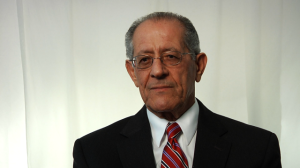The Press in Bahrain: Mostly a Tool of the Regime
Emile Nakhleh*
Bahrain had a rich tradition of relatively free press in the first decade of its independence, but no more. Following the demise of the democratic experiment in 1975, the ruling family has run the country by decree. The press was the first casualty of this type of family rule, which has controlled Bahrain for nearly 40 years. In 2014, six of the seven daily newspapers, including Akhbar al-Khalij, al-Watan, and al-Ayyam, are pro-government and basically act as the mouthpiece of the regime. Only one newspaper, al-Wasat, under the editorship of Mansoor al-Jamri, is relatively independent of government influence. Yet, in order to avoid forced closure by the regime, it too has had to practice self-censorship. Two widely followed opposition outlets—an on-line newspaper (Bahrain Mirror) and a television station (Lu’lu’a) operate outside Bahrain. Although the Bahraini authorities constantly block their sites in the country, many Bahrainis find ways around government restrictions to get access to the two outlets. Internet, Facebook, and Twitter providers are more restricted than ever. Several print and digital media news providers and citizen journalists are languishing in Bahraini jails.
The 2014 Freedom House report on freedom of the press in Bahrain judged the Bahraini press as “Not free.” According to the report, on a scale of 0-100 where 0 is best and 100 is worst, press freedom in Bahrain scored 87. Bahraini journalists continue to face violent repression, including beatings, harassment, arrests, and torture. Many independent foreign journalists have been denied entry to Bahrain or expelled from the country merely for reporting on street protests and confrontations with the police. The al-Khalifa regime has used anti-Shia sectarianism to rally the support of pro-government newspapers against all forms of opposition. The ruling family has waged a feverish propaganda campaign in the country’s pliant press and on the new social media and hired foreign publicists—“access” academics, sitting and retired diplomats, and think tanks—to present a gentle picture of the regime’s abysmal human rights record. The government’s Information Affairs Authority and the Ministry of Information use their power to censure and halt the distribution of domestic and foreign publications if they are deemed a threat to the al-Khalifa regime. Of course, the government controls all broadcast media. Although the ruling family has stoked bloody sectarianism to demonize the Shia majority, it has frequently accused the opposition media of promoting sectarian extremism.
The 2002 Press Law (Decree-by-Law No. 47) is frequently used to impose severe restrictions on journalists, correspondents, bloggers, citizen journalists, and newspaper editors. It contains 17 different types of offenses for which journalists may be fined and imprisoned. Almost a dozen journalists, photographers, bloggers, freelance photographers, and video producers currently are in detention. Some have been injured and tortured and are routinely mistreated with impunity.
Journalists could face criminal charges and imprisonment if they are accused of criticizing Islam, insulting the king, investigating issues or practices relating to state security, or undermining state security. Such actions are not clearly delineated in the law, which gives the government wide latitude to criminalize these actions and impose harsh penalties. The regime is intent on silencing the press and preventing any criticism of government discriminatory policies against the opposition and the larger Shia majority. The regime’s draconic use of the Press Law stands in clear violation of the 2002 Constitution, which guarantees freedom of expression and the press. The al-Khalifa government has willfully abandoned the country’s traditions of free press and is intent on transforming the island country from a state that prided itself on pace-setting accomplishments in culture, education, and pluralism into a family fiefdom that rules with impunity outside the confines of civilized law and accountability.
*Dr. Emile Nakhleh is a Research Professor at the University of New Mexico, a member of the Council on Foreign Relations, and author of A Necessary Engagement: Reinventing America’s Relations with the Muslim World andBahrain: Political Development in a Modernizing Society
